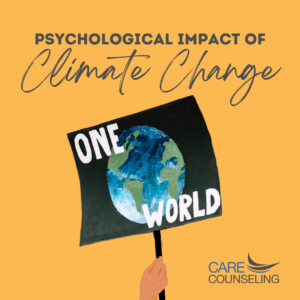The Psychological Impact of Climate Change
 Climate change has emerged as one of the greatest challenges facing humanity, not only in terms of its environmental implications but also its psychological impact. As the consequences of climate change become more apparent, individuals are experiencing a range of psychological responses. In this blog post, we will explore the psychological effects of climate change, including eco-anxiety and grief. Furthermore, we will discuss the critical role of psychology in promoting sustainable behaviors, fostering psychological resilience, and mitigating climate change.
Climate change has emerged as one of the greatest challenges facing humanity, not only in terms of its environmental implications but also its psychological impact. As the consequences of climate change become more apparent, individuals are experiencing a range of psychological responses. In this blog post, we will explore the psychological effects of climate change, including eco-anxiety and grief. Furthermore, we will discuss the critical role of psychology in promoting sustainable behaviors, fostering psychological resilience, and mitigating climate change.
Climate change poses significant psychological challenges. One of the prominent psychological responses is eco-anxiety, a chronic fear and worry about the environmental crisis and its impact on the future. The magnitude of climate change can lead to feelings of helplessness, guilt, and despair. Additionally, individuals may experience climate-related grief, mourning the loss of ecosystems, biodiversity, and a stable climate. Witnessing the destruction caused by natural disasters can evoke emotions akin to grief and despair.
Psychology plays a vital role in addressing climate change by understanding human behavior and promoting sustainable actions. By examining the psychological factors that influence our choices and behaviors, psychologists can design interventions to encourage environmentally friendly actions. This includes raising awareness about the consequences of climate change, providing education on sustainable practices, and promoting pro-environmental attitudes.
Building psychological resilience is essential for individuals to cope with the psychological impact of climate change. Resilience enables individuals to adapt, recover, and maintain well-being despite adversity. Strategies for fostering resilience in the face of climate change include:
- Encouraging Emotional Regulation: Developing emotional regulation skills helps individuals manage eco-anxiety and process climate-related emotions in a healthy way. Practices such as mindfulness and self-compassion can be valuable in this regard.
- Building Community and Social Support: Cultivating supportive relationships and a sense of community can help individuals feel connected and empowered to take action. Engaging in collective efforts and finding support networks can alleviate feelings of isolation and strengthen resilience.
- Empowering Agency and Efficacy: Promoting a sense of personal agency and self-efficacy empowers individuals to believe in their capacity to make a difference. Encouraging small, tangible actions and emphasizing the cumulative impact of collective efforts can enhance resilience.
- Fostering Hope and Optimism: Highlighting success stories, sharing positive initiatives, and emphasizing the potential for positive change can foster hope and optimism in the face of climate change. This outlook motivates individuals to take action and promotes psychological resilience.
Mitigating Climate Change through Psychological Approaches:
Psychological approaches are crucial for addressing climate change and promoting sustainable behaviors. Effective strategies include:
- Environmental Education and Communication: Psychology can inform the development of educational campaigns that emphasize the urgency of climate change and provide practical steps for individuals to reduce their carbon footprint.
- Behavioral Interventions: Psychologists can design interventions to encourage sustainable behaviors, utilizing techniques such as social norms, incentives, and feedback mechanisms to promote positive change.
- Policy and System-Level Interventions: Psychology can inform the development and implementation of policies that promote sustainable practices, create supportive environments, and incentivize sustainable behavior at a systemic level.
Climate change poses not only environmental challenges but also significant psychological impacts. By understanding and addressing the psychological effects of climate change, we can foster psychological resilience, alleviate eco-anxiety and grief, and promote sustainable behaviors. Psychology plays a pivotal role in raising awareness, empowering individuals, and designing effective interventions to mitigate climate change. By combining our collective efforts, embracing sustainable practices, and integrating psychological insights, we can work towards a more sustainable future, bolstering both the health of our planet and the well-being of humanity.



























